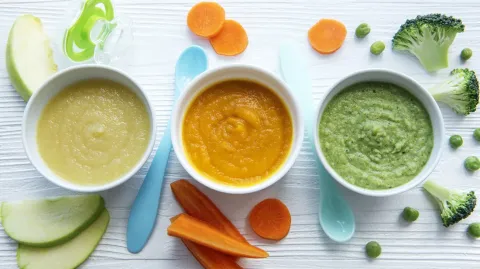The Risks of Sugar Consumption in Babies and Healthy Alternatives
Seeing your baby’s happy expression while feeding can warm a mother's heart deeply. Especially when your baby enjoys a new flavor, that tiny smile often makes mothers instinctively think “I should offer this more.” But when it comes to “sweet foods,” it is very easy to go beyond the limits without even noticing. Babies are born with a natural desire for sweet taste this is completely biological. However, this preference is intended for natural sugars; the lactose in breast milk and the natural fructose in fruits are the kind of sweetness suitable for babies. It is not meant for refined sugars, packaged products, sugar added formulas or artificially sweetened foods. For this reason, building the correct “sweet perception” starts from the earliest stage. Foods introduced during infancy affect childhood eating habits and even adult food preferences. Babies who meet sugar too early develop a higher sweetness threshold, and natural tastes start to feel “less sweet,” which leads them to consume more sugar in the future.
Why is Sugar Risky for Babies?
A baby’s digestive system, nervous system, hormonal balance and immune system are not yet fully developed. Refined sugar quickly spikes blood glucose, creating a short moment of happiness, but shortly afterwards it causes renewed hunger. This cycle disrupts appetite regulation. Babies start to confuse real hunger cues. Especially during rapid growth phases, this may lead to unnecessary calorie intake and unwanted weight gain. Excess sugar consumption increases the risk of tooth decay. Experts even note that early tooth decay can appear in babies who encounter sugary drinks or foods before their first teeth fully erupt. The gut microbiota is also negatively affected by sugar. Since most of the immune system is managed through the gut, sugar can weaken immunity by harming gut flora. Therefore, sugar does not only affect weight it negatively affects immunity, digestion, dental health and appetite balance.
The Difference Between Fruit Sugar and Refined Sugar
Many parents think “Fruit is sweet, isn’t that sugar too?” Yes, fruit contains natural sugar, but the sugar is consumed together with fiber. Fiber allows sugar to be absorbed more gradually. When a baby eats pear or apricot, they consume fiber, vitamins, minerals and natural anti–inflammatory nutrients at the same time. But when the fruit is squeezed into juice, the pulp is removed, and fiber disappears. This makes the sugar rise much faster. That’s why fruit juice is not recommended for babies under 1 year old. Offering fruit as puree, finger food pieces or small natural chunks is the healthiest approach. This way, babies learn sweetness through natural, balanced sources.
Honey and Molasses Are Natural But Not Unlimited
Honey is seen as one of the most innocent sweeteners in general belief, but it should absolutely not be given before age 1 due to botulism risk. Molasses, although natural, is also high in fructose. When given regularly in large amounts, it creates sugar overload in the intestine. So “natural” does not mean unlimited. Honey and molasses must be given moderately and at the right time. Many mothers believe molasses mixtures help constipation; while sometimes it may help in small amounts, too much can actually worsen constipation. This shows that even natural sugars need balance and careful use.
Why is Avoiding Packaged Sugary Foods So Important?
Packaged products are not only about sugar they also contain various additives. For this reason, they negatively affect taste development, appetite control and gut health in babies.
- They distort taste perception, making natural flavors feel less sweet.
- They disturb gut microbiota due to colorants, artificial aromas and glucose-fructose syrup.
- They cause quick weight gain by creating repeated hunger cycles.
- They form addictive habits too early, increasing future junk food tendency.
- They increase the risk of early childhood tooth decay even before primary teeth fully develop.
For this reason, in the first two years, avoiding packaged sugary foods as much as possible is the healthiest approach.
What Should Healthy Sweet Alternatives Look Like?
The goal is not to eliminate sweetness completely but to provide it from the right sources. Fruits are naturally sweet. Pear, apricot, banana (in moderation), peach and similar fruits are healthy and natural choices. Fruit purees mixed with yogurt or small oat fruit blends offer both nutrient density and balanced sweetness. When the baby meets sweet taste this way, taste training becomes healthier and more natural.
Infancy builds the foundation for future eating habits. Excessive or improperly introduced sugar during early childhood can distort taste thresholds, harm appetite regulation, weaken immunity and lead to sugar dependency related issues later in life. That’s why shaping the “sweet perception” correctly in the first years is one of the smartest health investments. Using natural fruits, balanced amounts and simple ingredients supports both oral taste development and overall growth. This approach helps the child adopt healthy eating habits more easily in later childhood. Therefore, limiting sugary foods from early stages, teaching real sweetness from natural sources and staying away from packaged sweets as much as possible is one of the most valuable steps for both today and the long term health of your baby.





Comments0
No comments yet — be the first to comment!